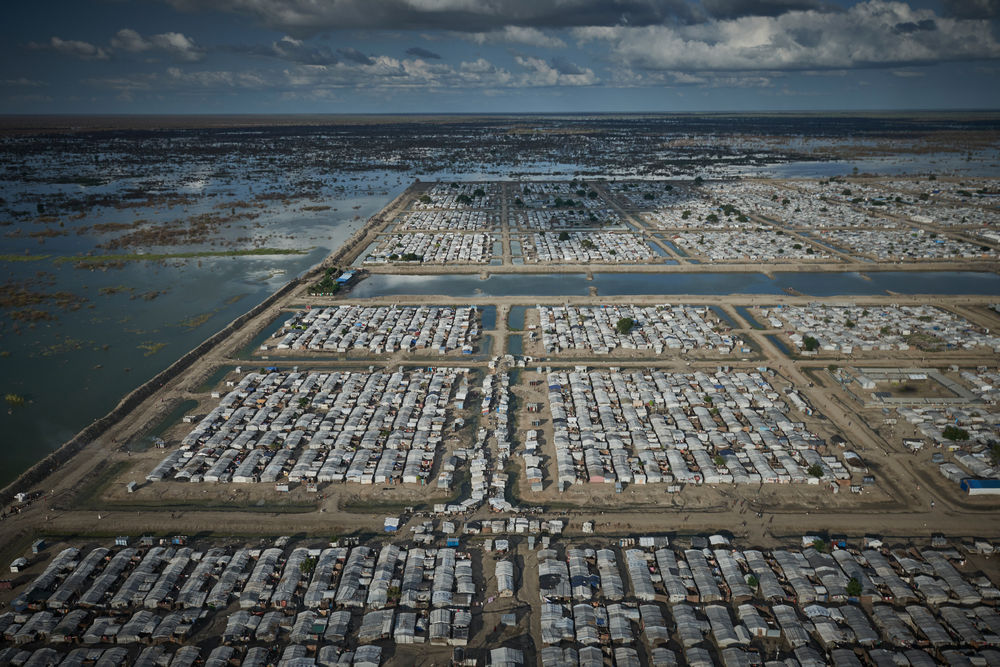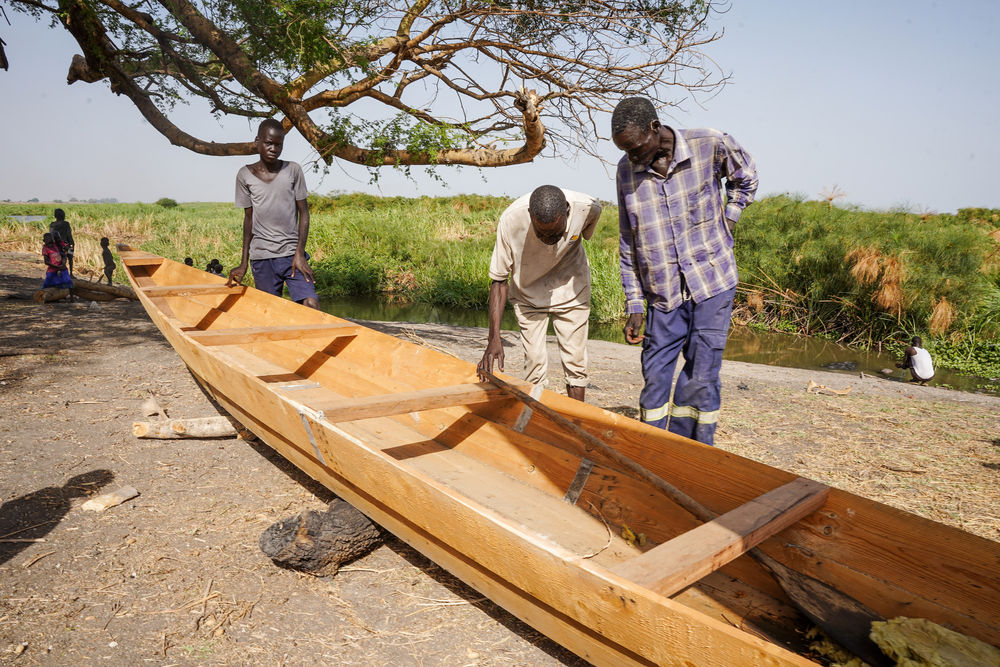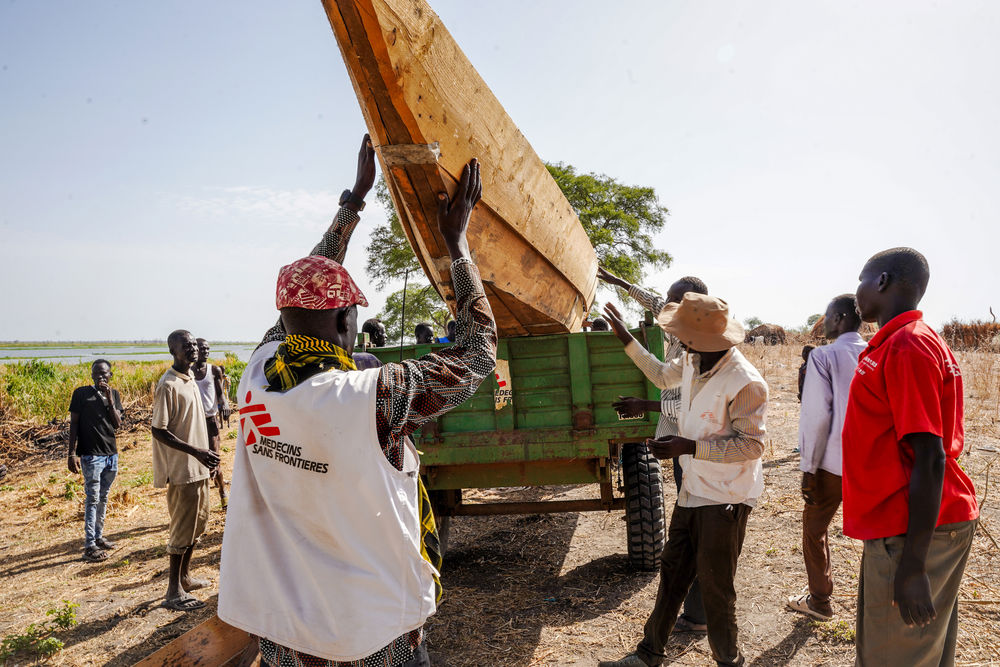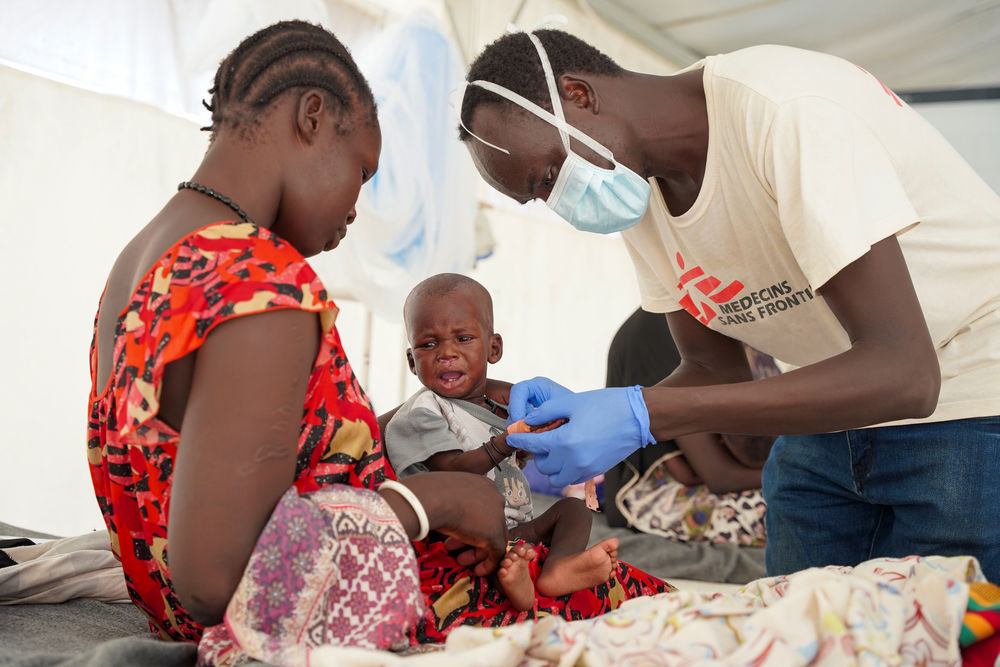In a parched landscape, an MSF tractor roars as it approaches a small village in Dentiuk, in South Sudan’s Upper Nile state. It is towing a trailer to which a creaking wooden canoe is strapped. “Are you sure we are in the right place?” asks the driver.
“It might not look like it, but when the rains come, this whole area is seriously hit by flooding and the only way to get around is by boat,” says Jorge, MSF’s logistics team leader. “Luckily, the houses in this village are built on higher ground.”
The village is one of 11 in Upper Nile state which have been given canoes by Médecins Sans Frontières to help transport sick people and expectant mothers during the rainy season, which usually runs from June to October.
This year’s rains have not yet arrived, but seasonal forecasts and climate change projections point to difficult times ahead. In May, the UN predicted that recent heavy rains in the Lake Victoria basin, coupled with the El Nino event expected later this year, will see parts of South Sudan experiencing severe flooding in the coming months.
Flooding has been a bane to South Sudan for many years, with the worst floods in the young nation’s history witnessed over the past four years, exacerbated by climate change. During the rainy season, floodwaters swept away entire villages, destroyed crops, drowned cattle and severely damaged infrastructure, while forcing hundreds of thousands of people from their homes..
Last year, a larger than ever portion of South Sudan was covered in water, and in some places the floodwaters have still not receded. In Bentiu, Unity state, the camp for displaced people is effectively an island protected by dykes, while some villages in Old Fangak, Jonglei state, are still under water.
 Aerial view of the IDP camp in Bentiu, and the dykes are the only thing protecting the camp from flooding. Photo taken on Aug 2022. © Christina Simons
Aerial view of the IDP camp in Bentiu, and the dykes are the only thing protecting the camp from flooding. Photo taken on Aug 2022. © Christina Simons
Mary Abur Thon, 26, was displaced from her home in Peldiarowei, Upper Nile state, by floods last August. She fled with her husband, their two children and their extended family to Akoka county, where the situation was marginally better. “After heavy rains one night, the level of water kept rising and the children could not even walk,” she says. “We had no food, as all the land was covered in water. We walked for days to this place. Then we found it flooded as well, but not as badly.”
For local people, the floods are a disaster, preventing them from accessing food and often isolating them in small, overcrowded areas devoid of infrastructure. Living out of doors, without mosquito nets and surrounded by the stagnant water where mosquitoes breed, dramatically increases people’s risk of contracting malaria, already the leading cause of death in South Sudan. The floodwaters contaminate water sources, raising the risk of waterborne diseases such as cholera and acute watery diarrhoea, while overcrowded conditions make it easy for infectious diseases to spread. Entire communities are cut off from access to medical care, putting many lives at risk.
For aid organisations such as MSF, reaching people in need becomes increasingly difficult as floods sweep away or cover roads, bridges and airstrips.
Against this backdrop, MSF has been helping communities prepare for the rainy season, while helping ensure that they can still access medical care.  The area chief for Aree village in Akoka County, Upper Nile State (right) and a local canoe builder examine the canoe donated by MSF to the village. © Paul Odongo/MSF
The area chief for Aree village in Akoka County, Upper Nile State (right) and a local canoe builder examine the canoe donated by MSF to the village. © Paul Odongo/MSF
“When people fall sick here, we have no means of transporting them to a place like Malakal, except by boat,” says Angau Biech, the chief of Aree village in Akoka county, which recently received a canoe from MSF. “Before, we had to hire boats for this, but now it will be easier for us to ferry people across the river to Kodok. Then MSF comes for them there.”
MSF has also been putting medical supplies in position in locations across the country, including in its projects in Upper Nile state, with a focus on the most vulnerable areas. By making sure that medications and supplies to treat malaria, waterborne diseases and infectious diseases are safely stored and readily available, MSF teams hope to be able to contain any future outbreaks early on and stop them from spreading.
To help communities provide the first line of care in emergency situations, MSF teams are also training key members of remote communities in medical skills, from basic first aid to advanced care, including supporting pregnant women during labour and assisting deliveries.
“Labour is not a process that can be slowed down once it starts, yet in these areas the nearest health facility is often several hours away, and much longer in times of heavy rains and flooding,” says Dinatu, MSF’s midwife activity manager in Malakal. “We are training traditional birth attendants in the villages to give them extra skills to support expectant mothers as they rush them to the nearest health facility.”
Given the scale of flooding in the past four years, it seems that massive floods are a new reality for South Sudan. Addressing the myriad complex challenges this raises will require concerted efforts by authorities, donors and the humanitarian community, both to ensure that people have access to medical care, and to anticipate and address the consequences of future climate change in the region.



